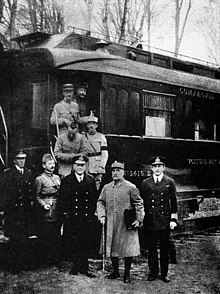About one and a half months before the signing of the Armistice on September 29th, German High Command informed Kaiser Wilhelm II and the Chancellor, Count Georg von Hertling, that the German situation on the line was hopeless. General Erich Ludendorff stated that he was unsure if the German troops could hold off allied forces for another 2 hours. Over the course of a month, German leaders were desperate for a cease fire, and turned to Woodrow Willson's Fourteen points plan. In an exchange with Wilson however, German leaders were unwilling to come to an agreement because Wilson insisted that if the US and Germany were to have an agreement, the Kaiser would have to abdicate, or step down from the throne. This ultimatum from Wilson further shows his desire to spread democratic ideals even outside of the US. Eventually, German High Command was able to come to an agreement which was the armistice.
The armistice was mostly written by Allied Supreme Commander Marshall Ferdinand Foch and included the stoppage of hostility, withdraw of German troops in Rhineland, allied occupation of Rhineland, preservation of infrastructure, german surrender of all forces, and the release of only allied war prisoners.

The image above shows Commander Marshall Ferdinand Foch, and other British negotiators after the signing of the Armistice.
I was just planning to write about this very significant historical event. I opened Blogger and found that the top blog is about the Armistice. November 11th really was a very important day in the lives of millions. For that we should always remember the 11th of November.
ReplyDeleteI thought that it was interesting how the Germans kept fighting knowing that they were going to lose. They fought so that the Kaiser would have to abdicate and hundreds of thousands of lives paid the price for that. I thought that it was odd seeing that the public's opinion on the war around the world was pretty bad and most wanted to end it ASAP. But then I also thought that this shows up other times in history like Japan's surrender in WW2. For them, their situation was unwinnable too, Germany had fallen, Italy was gone, and right after Hiroshima, the Soviet Union declared war on Japan. And although this wasn't the only reason why they refused to surrender, they were desperate to keep the emperor in power just like the Germans and the Kaiser. So they were willing to keep fighting until of course the atomic bombs were dropped and were forced to surrender. In the end, both sides lost and surrendered although Germany was killed in the treaty of Versailles, Japan had it better. They got to keep their emperor and they also had an economic miracle where they soon became the second largest economy after the US. It interesting to see two very different outcomes from two similar situations I guess.
ReplyDelete